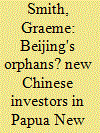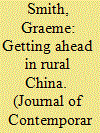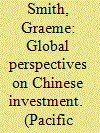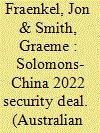|
|
|
Sort Order |
|
|
|
Items / Page
|
|
|
|
|
|
|
| Srl | Item |
| 1 |
ID:
120198


|
|
|
|
|
| Publication |
2013.
|
| Summary/Abstract |
This paper will explore the perspectives and narratives developed by three different sets of Chinese investors in Papua New Guinea (PNG): investors in the retail, mining, and construction sectors. It is estimated that 90 per cent of new Chinese private investors in the PNG retail sector hail from Fuqing, a coastal community in Fujian province with a long history of transnational migration. Larger state-owned mining ventures and construction companies draw on a more disparate workforce, even though they are headquartered in Beijing. All three sets of investors face different degrees of stigmatization from their competitors, the media, and different Chinese and local actors. Based on interviews with Chinese investors in PNG and China, and drawing on Chinese scholarly studies, this paper will explore the interaction of these three groups of investors with Chinese state and non-state actors, and evaluate how this shapes the process of "localization." The paper will examine how relations with state and non-state actors in PNG are evolving over time, as both groups find ways to "get things done" in a country where mainland Chinese investors have a short history of engagement.
|
|
|
|
|
|
|
|
|
|
|
|
|
|
|
|
| 2 |
ID:
154794


|
|
|
|
|
| Summary/Abstract |
China’s rise as a (re)emerging donor has attracted attention over the last decade, with a focus on Chinese development assistance as a challenge to the Organisation for Economic Cooperation and Development (OECD) aid norms. Knowledge of China’s domestic aid structure is needed to understand Chinese aid abroad. This paper addresses gaps in the literature and challenges the accepted nostrum that China’s Ministry of Commerce (MOFCOM) dominates China’s aid programme. Building on the authors’ experience as Chinese aid practitioners and scholars over more than a decade and drawing on over 300 interviews, the paper explores China’s aid decision-making processes by examining the main agencies, identities and informal interactions. We argue that the Chinese aid system is characterised by fierce and ongoing competition for influence among actors, especially MOFCOM, the Ministry of Foreign Affairs (MFA) and the Ministry of Finance (MoF), as well as the companies responsible for implementing Chinese aid projects.
|
|
|
|
|
|
|
|
|
|
|
|
|
|
|
|
| 3 |
ID:
139259


|
|
|
|
|
| Summary/Abstract |
This article will outline the politics and pathways of promotion among government officials working in a rural county in Anhui province and their attitudes towards elite status. It will analyze the implications these processes and pathways have for the operation of local government in rural China. Drawing on interviews and relationships spanning a ten-year period (2004–2013), this article primarily relies upon the personal experiences of colleagues and friends who have attempted to rise through the ranks of government and business in Benghai County, with varying degrees of success. While the article will focus on political elites, in Benghai it is impossible to separate business from politics. This article will delineate strategies adopted for career advancement and attaining elite political status, and the effects these strategies have on the relationship between political elites and ordinary cadres.
|
|
|
|
|
|
|
|
|
|
|
|
|
|
|
|
| 4 |
ID:
120191


|
|
|
|
|
| Publication |
2013.
|
| Summary/Abstract |
This introduction outlines some of the more influential academic studies on Chinese investment abroad, including the existing quantitative literature on Chinese outbound direct investment (ODI). It introduces a case study from Australia involving state-owned mining conglomerate Chinalco, and the fallout from its failed bid for a share in Rio Tinto. The study confounds many of stereotypes about the behaviour of the Chinese central state. We go on to suggest frameworks developed in the study of China's domestic political economy that may be useful in analyzing the behaviour of Chinese state and non-state actors abroad. Such frameworks can help in understanding how Chinese investors develop informal institutions, and make use of existing formal institutions, to "get things done" in unfamiliar investment environments.
|
|
|
|
|
|
|
|
|
|
|
|
|
|
|
|
| 5 |
ID:
100500


|
|
|
|
|
| Publication |
2010.
|
| Summary/Abstract |
Over the last decade, rural township governments have been subjected to intensive streamlining and rationalization programmes. This article examines which ongoing reforms and processes are causing township governments to become "hollow shells," and explores the effects of "hollowing out" on township government leaders, staff and rural residents. While the aim of local government reform was to transform extractive township governments into "service-oriented" agencies, this article finds that the current logic of rural governance has produced township governments which are squeezed from above and below. From above, township leaders face the political imperatives of inspections, annual assessments, the need to attract industrial investment and an ongoing process of "soft centralization" by higher levels of government. From below, township staff are drawn out to the villages to enforce family planning policies and maintain social stability. Unprecedented numbers are working as "sent-down cadres" in villages where their capacity to deliver services has been weakened by village amalgamations and the lifting of agricultural taxes and fees. Despite significant boosts to rural health and education investment, rural residents still face a level of government that regards them as problems to be dealt with, rather than citizens to be served.
|
|
|
|
|
|
|
|
|
|
|
|
|
|
|
|
| 6 |
ID:
093844


|
|
|
| 7 |
ID:
187469


|
|
|
|
|
| Summary/Abstract |
A security deal struck between the Solomon Islands and China in April 2022 has been depicted as the precursor to the establishment of a Chinese naval base in the Pacific. Fed by the proximity of an Australian federal election, these fears have stimulated lurid images in the Australian press of Beijing's aircraft carriers being stationed off Brisbane's coast creating a Pacific version of the 1962 Cuban missile crisis. In this paper, we examine the provisions of the ‘framework agreement’, explore its rationale and consider the likelihood that the predicted naval base eventuates. We also investigate Chinese extraterritoriality on the global stage and Chinese commercial activity in the Solomons since the switch in diplomatic recognition from Taipei to Beijing in 2019. We argue that Solomon Islands Prime Minister Manasseh Sogavare signed the deal primarily in response to domestic pressures, in particular the danger of a repeat of major riots that took place in the capital in November 2021. The most pressing risk is not Chinese warships or nuclear missiles stationed in Honiara, but repression to handle urban unrest without the restraint required of Australian, Papua New Guinean, Fijian or New Zealand police officers.
|
|
|
|
|
|
|
|
|
|
|
|
|
|
|
|
|
|
|
|
|